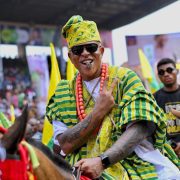Elite Women of Ancient Africa: Queen Nzinga Mbande of Ndongo
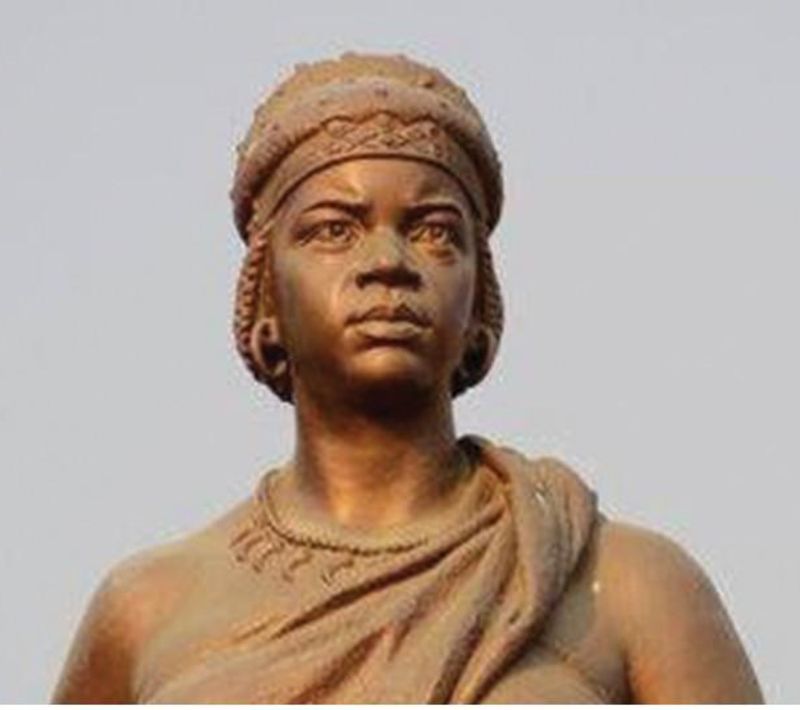
Know your feminist ancestors
Long, long ago, in the ancient times, before the days when we learned to count time differently, and the years when the sun was sovereign: Among the greatest rulers of the alkebulan people, there lived a princess whose strength and fierceness would make any Disney princess cower in fright. She was a woman, a black hero, a fierce warrior whose struggle against white imperialism in Africa is recorded as one of the greatest in history. Most importantly, a proud daughter of the soil – an Afrikaner. Her name was Queen Nzinga of Mbande, and this is her story.
Nzinga’s Story
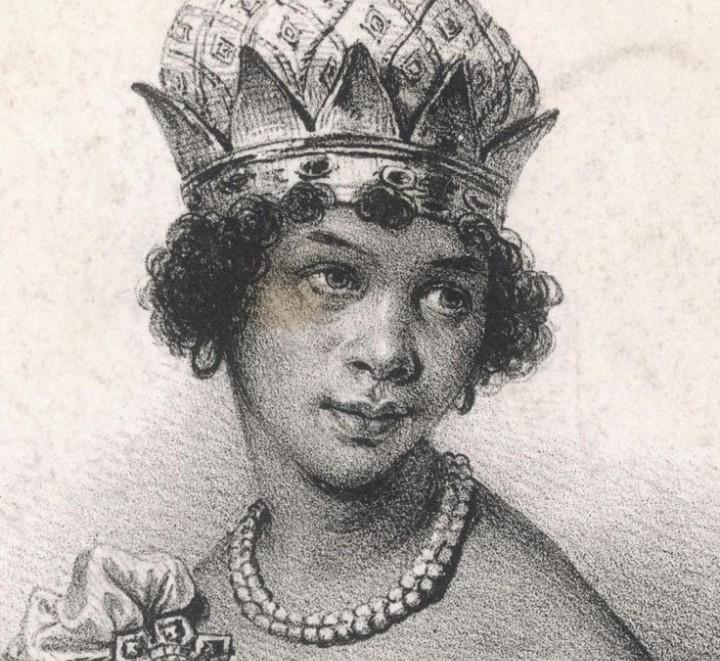 Portrait of Queen Nzinga Mbande with a foreign crown.
Portrait of Queen Nzinga Mbande with a foreign crown.
Queen Njinga Mbadi was born closely around the year 1583 in the central coast of Africa, to a royal family of the Ndongo people (which is present day Angola). The Portuguese had infiltrated Angola as early as the 16th century.
Born as the favorite child of king Ngola Mbandi Kiluanji Kia of the mighty Ndongo kingdom, our heroine exhibited remarkable skills and outstanding qualities at a budding age which led her to rule sovereignly for four decades in a society that was mostly patriarchally dominated. She lived a life of great exploits from a tender age till the last of her days on earth.
The Story Of Her Birth
Nzinga’s birth was in many ways extraordinary, symbolic, and strategic to the books of history. First, because she was born at a time when the transatlantic slave movement had just begun to ravage central Africa. The Portuguese had infiltrated Angola as early as the 16th century, and the transatlantic slave trade movement is renowned to be the largest forced displacement and movement of Africans across continents. This movement saw the deploration and inhumane treatments of the African people both as slaves and as a colony.
In the sixteenth century, at the time of her birth, Nzangi was born with her umbilical cord tied firmly around her neck. In spite of such a challenge, she somehow managed to survive. The people of Ndongo marveled at the strangeness of her birth and it was considered a sign from the gods to calm the anguish of the native people of the land: these people who had long been under the tyranny of the Portuguese government that had savagely infiltrated their territory.
Although a lot of children were born during this turbulent period, no child survived such a condition. Because of this, Nzangi was deemed special and pronounced a great child.
And so, her greatness was prophesied and proclaimed to the ears of all who sought to listen from the beginning of her days. A special girl born to rule, and one day liberate her people from their colonial masters.
Following the theatrics surrounding her birth, her parents named her Nzinga from the kimbunda language which loosely translates to mean “to twist or turn”. This name was symbolic in many ways, and would later go on to show that her life would be tumultuous, charismatic, and eventful. Characteristics fitting for a queen.
Some versions of the story also point that after the time baby Nzinga was born, a wise old woman who could foresee the future proclaimed that she would one day be queen. At the time of this prophecy, it was a strange thing to say as she had a brother who according to the laws of the land would naturally inherit the throne. During the time of this prophecy, people were not so familiar with matriarchal rulers in that part of central Alkebulan.
After Nzinga’s Birth
Nzangi grew up under the daunting influence of her father. Her superb negotiation skills and ability to manage conflict dexterously positioned her as a person of great intellectual wealth and capacity which later went on to clearly distinguish her from her siblings.
Born amidst two sisters, and a jealous brother who thwarted her rise to glory, and who would later play a remarkable twist in the story of the Lunanda kingdom, Nzangi had many foes.
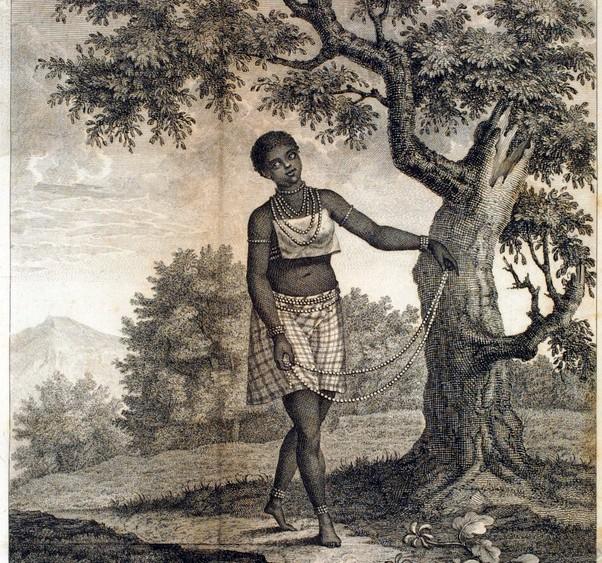 “Female Clothing, Angola, 1786-87”, Slavery Images: A Visual Record of the African Slave Trade and Slave Life in the Early African Diaspora.
“Female Clothing, Angola, 1786-87”, Slavery Images: A Visual Record of the African Slave Trade and Slave Life in the Early African Diaspora.
About the time of her birth, the Portuguese had fully invaded the region without opposition for 50 years.
Nzangi’s father, who was the traditional ruler and king of the people, had signed an agreement with the Portuguese to offer a few slaves from time to time for their trade. But the Portuguese only thought it right to defy the boundaries of this agreement as they kept pushing harder and harder, demanding for more slaves to sell.
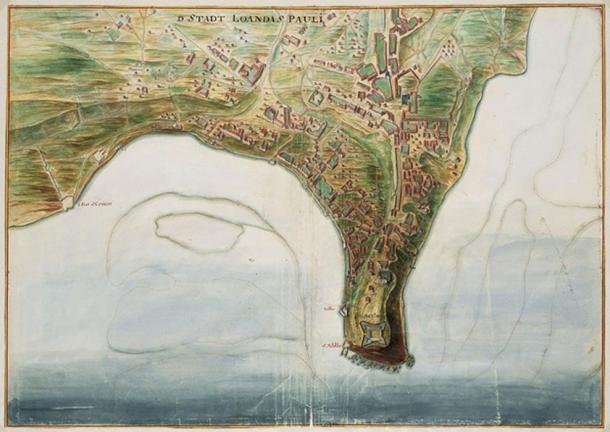 Map of central Africa infiltrated by the Portuguese.
Map of central Africa infiltrated by the Portuguese.
At a tender age, Nzangi proved herself to be efficient, smart, and attentive than her peers and this provided her entry to her father’s private and most exclusive meetings where the state of affairs was primarily discussed amongst top military officials. With this experience, Nzangi exploited the opportunity to upskill herself in the politics of negotiation and strategic militarism. She sat close at her father’s feet and schooled herself under his governance.
As she was a keen observer, Nzinga and her first brother Ngola Mbandi grew up watching their father make tough decisions under the burden of colonization from the Portuguese.
She was scholarly and even more physically adept than her siblings which in many ways prompted sibling rivalry and hatred between the two. She became a witness to her father’s ways of leadership in war and she upskilled herself from the opportunity and counsels that this provided her.
During this, the Portuguese were fast taking over and spreading their ruthlessness across the kingdom.
After her father’s demise. Nzinga’s brother’s animosity towards her grew by the day, and he felt threatened that she might one day oust him from his position as king.
According to some versions of history, Nzinga rivalry with her brother extended for a long time, that when he finally took power, he ordered her first son to be murdered, and had her sterilized forever. Ensuring that there were no usurpers to the throne. This heinous display of superior barbarism only aggravated the spirited Nzinga, and she sought to seek revenge against her brother.
Luanda 1626
Nzinga’s Mission to The Portuguese
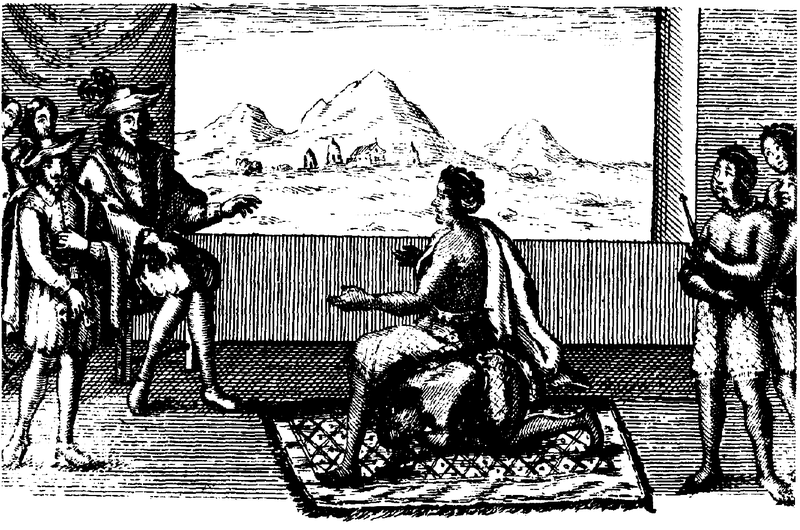 Queen Njinga meeting with Portuguese Governor Joao Corria de Sousa, 1622. Public domain image
Queen Njinga meeting with Portuguese Governor Joao Corria de Sousa, 1622. Public domain image
During this time, the Portuguese were pushing too fiercely at the people of the land, and Nzinga’s brother out of desperation had sought her advice and counsel. He gave her the right opportunity and made her top emissary to negotiate with the Portuguese. Now, asides being a fierce warrior and spirited survivor, Nzinga was also a powerful negotiator. And recorded to be one of the best in the books of history. She was well vast in the language of the Portuguese. With expertise and experience from her father’s state meetings, she was unstoppable, and yet again, the best qualified to represent the people of Ndongo.
Nzinga was sent as Ndongo’s representative to negotiate with the Portuguese governor, Corrêa de Souza, based in Luanda.
On that day, Nzinga had set out to the meeting with an emissary of slaves and witnesses to discuss peace terms with the Portuguese but the most remarkable thing happened. Upon reaching the venue, the Portuguese denied her a chair and demanded that she sit on the floor, at the feet of the Portuguese governor. With this ruse, the Portuguese wanted Nzangi to place herself at his feet.
Upon seeing the treachery and political ruse the Portuguese intended to play on her, Nzinga strategically ordered her servant to stoop on all fours, providing a human stool for her to sit. There and then, her actions immediately earned her the respect of the Portuguese and she was able to negotiate the terms of her people on an equal footing with the Governor. Following the negotiations, an agreement was reached which led to the withdrawal of the Portuguese forces from the Ndongo territory.
This act earned her the praises and respect of her people and was one of the first major moves that Nzinga made against the Portuguese.
The New King Dies and Nzinga Becomes Queen: Her Ascension to Power
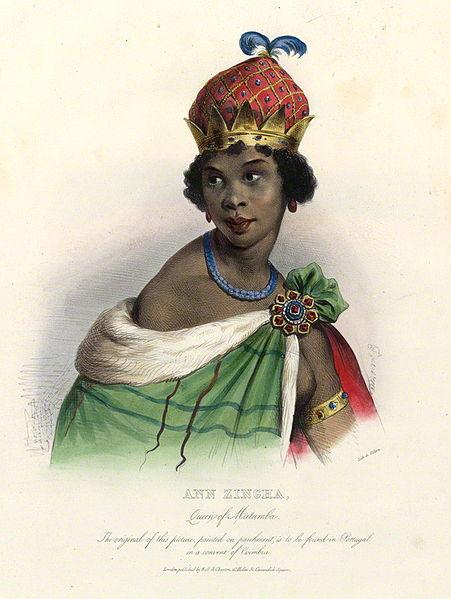 Wikimedia Commons
Wikimedia Commons
Many controversial tales surround Nzinga’s rise to power. One account declares that Nzinga’s brother, Mbandi, excessively pressured by the activities and demands of the Portuguese colonists, resolved to commit suicide and save his pride. Another account that is vastly more popular than the other has it that Nzinga was believed to have murdered her brother, thereby seizing power and taking control. Rumors tell that Mbandi had become a weakling and puppet to the Portuguese.
Whichever part of the story is correct is still unknown. However, what we do know is that the death of Mbande Ngola paved the way to the start of the empire of Queen Nzinga.
Four years later, she secured her place as queen and was mounted as supreme ruler of the Ngondo kingdom.
During the 17th century, when Nzinga learned that her nephew, Ntando, Mbande’s son, was hidden amongst the people of Imbingala, a group of treacherous mercenaries, she rallied around them until she won their loyalty and affection. When everyone least expected, she reached to her nephew, slit his throat, and threw his body into the river; declaring to everyone that she had avenged her son who had been cruelly murdered by her brother, and secured her throne forever.
Queen Nzinga, who is also called Njinga of Mbande, was one of the most powerful rulers on earth. As a matter of fact, she was one of the most powerful military leaders in Africa.
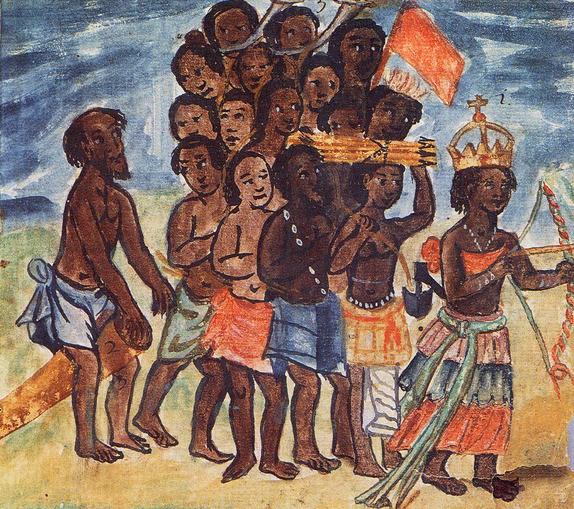 (Queen Nzinga with Military Entourage, Kingdom of Matamba) Slavery Images: A Visual Record of the African Slave Trade and Slave Life in the Early African Diaspora.
(Queen Nzinga with Military Entourage, Kingdom of Matamba) Slavery Images: A Visual Record of the African Slave Trade and Slave Life in the Early African Diaspora.
Ntimga was not only the Queen of Ndongo, she was also the Queen of Matamba. She took refuge in Matamba when she was exiled from Ndongo by her brother,
When the Portuguese broke their treaty and agreement and tried to fight back, she fled to Matamba.
Upon arriving in Matamba, she formed an alliance and married the chief of the land in order to powerfully reinforce her army.
She was a great military strategist and the first in the books of history to create an alliance with a European country in order to fight back against another European country, forming an alliance with the Dutch. Being Queen of two kingdoms; Matamba and Ndongo, Nzangi till today is distinguished as one of the most critical strategists and a woman of intellectual prowess.
Njimga Mbande also known as Nzinga is still presently described as a key figure in Africa’s resistance to colonialism. Her rise to power is further attributed to her negotiation skills and natural charisma. The Portuguese had infiltrated Angola as early as the 16th century.
Nzinga’s Top Achievements
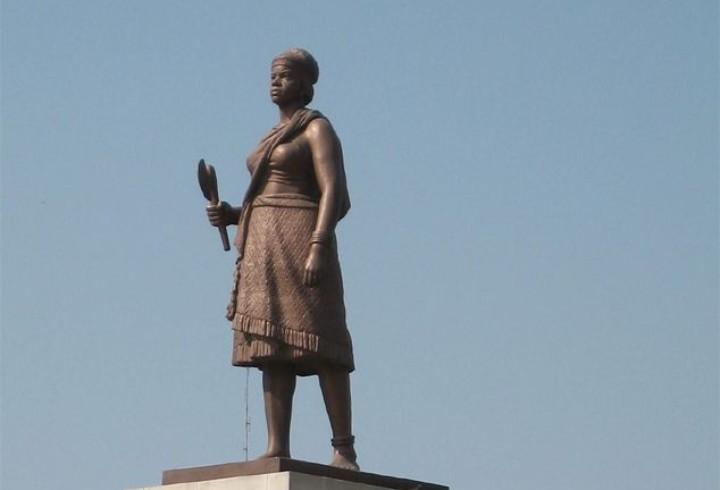
Nzinga till today is renowned as one of the best military strategists in the world. In the year 1627, she exploited the existing rivalry that the Portuguese had with the Dutch. By forming an alliance with the Dutch army, Nzinga was able to defeat her enemies in 1647. She was able to keep the Portuguese away from her kingdom even after the Dutch were in turn defeated, deposed and expelled from Central Africa the following year.
In spite of continued attempts by the Portuguese to end queen Nzinga’s rule, Nzinga orchestrated military strategies and guerilla attacks which in return fueled and encouraged a defined spirit of resistance in her people.
When the Portuguese betrayed their pact of the signed treaty and demanded an increase in the number of slaves, Queen Nzinga grew furious and skillfully hid slave captives in remote villages away from their oppressors.
As more of a political move than a religious one, Nzinga agreed to be baptized and bound to the rules of the catholic church as a way of implementing change. She in turn was christened after the governor, and the governor’s wife proclaimed herself as Nzinga’s godmother. To help with the upliftment of education and innovation of her people, Nzinga proposed and reasoned that this would create a friendly bond with the European missionaries and improve the advancement of science and technology within her kingdom. With this in mind, she led her people’s convergence to Catholicism and was christened and given the name Anna de Sousa which is sometimes interchangeable with Mbande Ana Njinga, Ann Njinga, Nzinga of Mbande, Rainha Gingha, and Ngola Njinga.
In 1623, Nzinga was pronounced Governor of Luanda for the Portuguese and she maintained this position till 1626 when she was cruelly ousted from her position as queen. She was replaced with a puppet who kowtowed like a dummy to all the demands of the Europeans. In 1630, she formed an alliance with the Imbangala people and returned to power as the queen of two kingdoms.
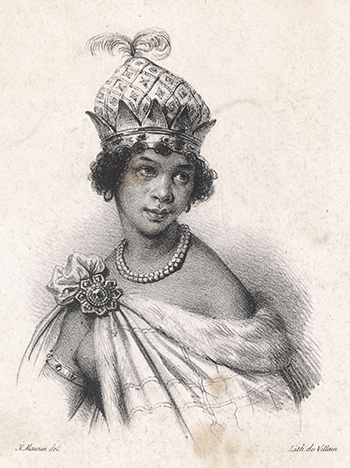
Queen Nzinga died peacefully in her eighties on December 17, 1663, of natural causes. To this day, Nzinga remains a legendary warrior that’ll never be forgotten by the books of history.
Sources:
- The Met Museum 150: Nzinga Queen of Ndongo (October 2003).
- Snethen, J. (2009, June 16) Queen Nzinga (1583-1663). Retrieved from here
The one who spells Afrolady from the larynx of her pen. She’s a high spirited, cultured and ingenuous African child, whose writing drops an unimaginative creative splash on history and carves the indignation and memories of Black women.

